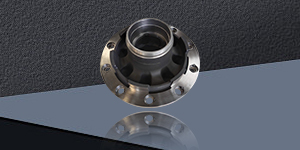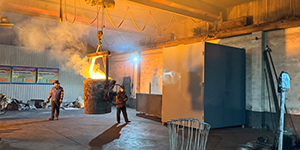What are the common causes of brake drum failures?
2023-11-28
The so-called brake drum is part of the drum brake system. When braking, the piston exerts pressure on two pairs of half-moon-shaped brake shoes, making them close to the inner wall of the drum, thereby generating friction to stop the rotation of the wheel.
While the vehicle is driving, after depressing the brake pedal to the bottom, it cannot brake immediately. The braking effect is weak and the vehicle continues to slide. Check the road surface to see that there are no drag or pressure marks on the tires. There are the following reasons:
1. The brake shoe friction pad has been used for a long time and is severely worn. Or when driving in mountainous areas and braking is used frequently, the friction generates high temperatures, which causes the surface layer of the friction pad to ablate and age, and it is not replaced in time.
2. During the riveting repair process of the brake shoe friction plate, the quality is poor, the rivets are loose and wobbly; the brake gap is adjusted improperly or not in time; gravel particles enter the brake drum or the rivets fall off, causing grooves on the surface of the drum and plate. , poor contact, reduced braking performance.
3. The inner hole of the brake shoe support pin sleeve is worn out, causing the shoe to sink and making it difficult to adjust the clearance; or the brake shoe support adjustment cam is rusted and stuck in the sleeve, which hinders the adjustment of the brake clearance and reduces the braking force. Effect.
4. The adjustment of the brake drum bearing nut is too loose or too tight. When it is too loose, the vehicle will sway and the friction plate will have poor contact with the brake drum; when it is too tight, the bearing will heat up and the lubricating oil will become thinner and drip onto the friction plate, causing slippage and brake fatigue.
5. The air compressor is not working properly, resulting in insufficient air pressure in the air reservoir, air leakage in the brake pipeline, loose sealing of the brake valve, etc.; damage to the cup of the wheel pump; oil leakage in the air compressor, causing a large amount of oil, Failure to enter the brake line may cause the brakes to become weak.
6. The free stroke of the brake pedal is too large; the gap between the brake drum and the disc is not adjusted properly, and the brake drum is out of round; the worm on the brake arm is improperly adjusted, causing the brake cylinder push rod to extend too much, and the composite brake valve The balance spring blocks the hairpin, and the inner and outer balance springs interfere with movement during braking.
Related Articles

What is the difference between drum brake, disc brake and drum brake?
In today's family cars, the braking methods used are nothing more than disc brakes (disc brakes) and drum brakes (drum brakes). In the eyes of most people, disc brakes represent advancement, and drum brakes It represents backwardness, but is this really what internship is?

What material are car brake drums generally made of?
The automobile brake drum is a brittle gray cast iron material

What is the difference between wheel hub and brake drum?
What is the difference between wheel hub and brake drum?

What is the difference between drum brake, disc brake and drum brake?
In today's family cars, the braking methods used are nothing more than disc brakes (disc brakes) and drum brakes (drum brakes). In the eyes of most people, disc brakes represent advancement, and drum brakes It represents backwardness, but is this really what internship is?

What material are car brake drums generally made of?
The automobile brake drum is a brittle gray cast iron material

What is the difference between wheel hub and brake drum?
What is the difference between wheel hub and brake drum?










